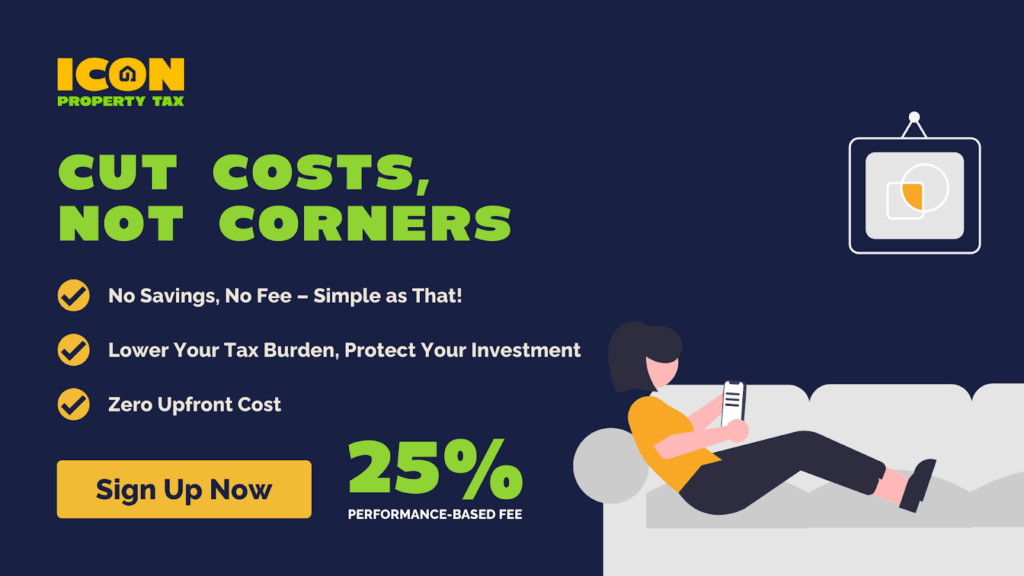What Causes A Property Tax Reassessment (And How To Get Ready For It)
August 31, 2025
Key Takeaways:
- Common Triggers Explained: Understand the key events—like property sales, renovations, or market shifts—that commonly trigger a property tax reassessment.
- Impact on Your Tax Bill: Learn how a reassessment can impact your tax bill, and why local market trends matter just as much as your own improvements.
- Smart Preparation Tips: Get practical strategies to prepare for reassessment and appeal unfair valuations, with expert guidance from firms like Icon Property Tax.
With over $2.5 billion in client assets successfully represented and a proven track record of reducing property tax burdens across all 50 states, Icon Property Tax is the go-to resource for smart, strategic tax reduction. Our seasoned professionals partner with everyone from individual homeowners to Fortune 500 corporations to make certain that their property valuations—and the taxes they pay—are fair and accurate.
Property taxes are one of the largest ongoing expenses for property owners, yet they’re often misunderstood or overlooked until it’s too late. One of the most significant and least expected events that can affect this cost is a property tax reassessment. These reassessments can be triggered by various factors—some obvious, like a recent sale, and others more subtle, like changes in market conditions. The result? You might find yourself facing a much higher tax bill without much warning.
Understanding what causes a reassessment and how to prepare for one isn’t just about saving money—it’s about gaining control over your long-term financial planning and avoiding unnecessary stress. Whether you’re a homeowner, investor, or commercial property owner, knowing what to watch for can give you the upper hand. In this piece, we’ll break down what triggers a property tax reassessment and how you can get ready for it with confidence.
What Is A Property Tax Reassessment?
A property tax reassessment is the process by which your local tax authority re-evaluates the assessed value of your property. This value is used to determine how much you owe in property taxes each year. Typically, this reassessment reflects changes in the market, improvements to the property, or shifts in local tax policy.
Unlike a routine annual adjustment that might track inflation or broad market shifts, a reassessment is often more in-depth and can significantly change your tax bill. It aims to align your property’s assessed value with its current market value so that property taxes are fair and accurate across the board.
In most cases, the reassessment process involves reviewing property characteristics like square footage, condition, location, and recent sales data. Once the value is updated, it’s multiplied by the local tax rate to calculate your new property tax obligation.
Why Property Tax Reassessments Happen
Property tax reassessments serve an important role in making certain that fairness and accuracy in a community’s tax system. They help local governments align property values with actual market conditions so that every property owner pays their fair share based on the true value of their home or commercial building.
Reassessments are especially necessary in areas where property values have significantly changed due to economic growth, development, or decline. Without periodic reassessments, some homeowners might be overpaying taxes while others underpay, creating an imbalance in public revenue.
Local governments also rely on reassessments to update tax rolls and maintain the funding necessary for fundamental services, like schools, fire departments, infrastructure, and public safety. It’s not just about correcting values; it’s about keeping the tax system functional and equitable.

Common Triggers For A Reassessment
Several events can trigger a property tax reassessment, even outside of the regular assessment cycle. Understanding these triggers can help you anticipate changes to your tax bill and prepare accordingly.
Property Sale Or Transfer
When a property is sold or changes ownership, it often prompts a reassessment. Local authorities use the sale price as a key indicator of market value.
Major Renovations Or Improvements
Significant upgrades—such as adding a new room, building a garage, or installing a pool—can increase your home’s value and lead to a reassessment.
New Construction
If you build a new structure on previously vacant land, it will likely be assessed for the first time once construction is complete.
Permits Pulled For Remodeling
Even if improvements are modest, pulling permits can alert the assessor’s office to changes, prompting a review of your property’s value.
Market Value Adjustments
In rapidly appreciating neighborhoods, mass reassessments may be conducted to reflect increased market demand, even if individual properties haven’t changed.
Error Corrections Or Appeals
If a previous assessment contained mistakes or was successfully appealed, the reassessor may revisit your property’s value later for accuracy.
How A Reassessment Affects Your Taxes
A reassessment can either raise or lower your property tax bill, depending on how your property’s new assessed value compares to its previous one. The effect isn’t just about your individual property—it also depends on how values shift across your neighborhood or municipality.
If Your Assessed Value Increases
A higher assessed value usually means higher taxes, especially if your increase is above the average in your area. However, if everyone’s values go up similarly, your share of the tax burden might not change much.
If Your Assessed Value Decreases
A drop in your property’s value can lower your taxes, but not always. If the entire area declines in value, your percentage share might stay the same, or even increase, depending on how other properties change.
Tax Rate Vs. Assessed Value
Remember, your total tax bill is a function of both the assessed value and the local tax rate. Sometimes, local governments adjust tax rates to balance their budgets after a reassessment, which can offset the change in your home’s value.

How To Prepare For A Property Tax Reassessment
Being proactive can help you manage the impact of a property tax reassessment—and possibly avoid overpaying. Here are some pivotal steps to help you get ready:
Keep Records Of All Property Changes
Maintain documentation for any renovations, repairs, or upgrades you’ve made. This helps justify your property’s value if needed and clarifies what does or doesn’t contribute to an increase.
Track Comparable Properties
Keep an eye on recent sales in your neighborhood. If similar homes are selling for less than your assessed value, you may have grounds for appeal.
Review Past Assessments
Go over previous assessment notices and property descriptions. If there are errors, like inflated square footage or incorrect features, you’ll want to get them corrected before the next reassessment.
Budget For Possible Increases
Even if you believe your property hasn’t changed much, market-driven reassessments can still raise your tax bill. Setting aside funds for a potential increase can prevent financial surprises.
Consult A Property Tax Specialist
Companies like Icon Property Tax specialize in helping homeowners and businesses review and appeal assessments. Their knowledge can be especially valuable if you suspect an overvaluation.
What To Do If You Think Your Reassessment Is Wrong
If you believe your new assessed value is too high or based on incorrect data, you have the right to challenge it. Here’s how to take action:
Review The Assessment Notice Carefully
Check for mistakes in property details like square footage, number of bedrooms, or recent improvements. Even minor errors can affect your tax burden.
Gather Evidence
Collect photos, property records, and recent sales data from comparable homes in your area. This evidence will support your case if you choose to file an appeal.
Understand The Appeals Process
Most jurisdictions have a formal process and strict deadlines for submitting appeals. This usually involves submitting documentation and possibly attending a hearing.
File A Timely Appeal
Appeals must often be filed within 30 to 90 days of receiving your notice. Waiting too long could forfeit your right to dispute the assessment.
Consider Professional Help
Partnering with firms like Icon Property Tax can simplify the appeal process. Their team understands local regulations and has experience negotiating with assessors to reduce inflated valuations.
How Our Professionals Help You Manage Reassessments
Dealing with a property tax reassessment can be time-consuming, confusing, and stressful, especially if you’re unfamiliar with local tax laws or how property values are calculated. That’s where our professionals come in.
We specialize in property tax solutions for both homeowners and commercial property owners. Their professionals offer services such as:
- Assessment Reviews: Our team analyzes your property assessment for accuracy and identifies opportunities to lower your tax burden.
- Appeal Representation: If your reassessment is too high, our professionals can prepare and file an appeal on your behalf, managing the entire process from start to finish.
- Market Comparisons and Valuation Insights: With deep knowledge of real estate trends and local tax rules, we provide accurate insights on how your property stacks up—and whether the assessed value is fair.
- Strategic Advice: Whether you’re buying, selling, or improving your property, our team can help you plan for future reassessments and avoid unexpected tax hikes.
By working with professionals like Icon, you can protect your finances and guarantee that your property is taxed fairly, without having to manage the process alone.

Final Thoughts
Property tax reassessments are a normal part of homeownership and local governance, but they can still catch you off guard if you’re not prepared. Understanding what triggers a reassessment, how it affects your tax bill, and what steps to take if something seems off can save you both stress and money.
Whether you’ve recently bought a home, made improvements, or just want to verify that you’re being taxed fairly, staying informed is your best defense. And if the process feels overwhelming, companies like Icon Property Tax are here to help guide you through every step, so you can focus on what matters most: enjoying your property without paying more than your fair share.
Frequently Asked Questions About What Causes A Property Tax Reassessment
What’s the difference between a reassessment and a revaluation?
A reassessment typically refers to an updated valuation of a single property, often triggered by a specific event. A revaluation is a broader process where an entire community’s properties are reviewed and updated to reflect current market conditions.
Can a reassessment be delayed or postponed?
Yes, some jurisdictions may delay reassessments due to budget constraints, staffing shortages, or policy decisions. However, once scheduled, they’re usually mandatory unless specific legislation intervenes.
Does a property tax reassessment automatically mean higher taxes?
Not always. While many reassessments result in higher values, they don’t guarantee a larger tax bill. Your taxes may stay the same—or even decrease—if the tax rate is adjusted accordingly or if your value increase is modest compared to others in the area.
How often are properties reassessed?
The frequency varies by state and municipality. Some reassessments occur annually, while others are done every few years or only when triggered by a qualifying event like a sale or renovation.
Can landscaping or curb appeal improvements affect a reassessment?
Generally, cosmetic improvements like landscaping do not affect your assessed value unless they significantly change the property’s use or utility. Structural upgrades are more likely to trigger reassessment.
Will insurance claims or repairs after damage affect my assessment?
Usually, repairs that restore your home to its original condition after damage (e.g., storm, fire) don’t result in reassessment. However, improvements that enhance the property beyond its previous state might.
Is it possible to predict when a reassessment is coming?
While some are predictable, like those tied to a sale or local revaluation schedule, others can happen unexpectedly if triggered by building permits, neighborhood development, or internal assessor audits.
Do reassessments apply to rental properties or vacation homes?
Yes, all real estate, including secondary homes and rental properties, can be subject to reassessment. In some cases, income-producing properties may be evaluated using different methods than owner-occupied homes.
How does a new zoning or land use policy affect reassessments?
Changes in zoning can affect a property’s potential use and, therefore its market value. If your property becomes more valuable under new zoning laws, that could trigger or justify a reassessment.
Can I prepare in advance even if no reassessment is scheduled?
Absolutely. Proactively maintaining accurate records, staying informed about local market trends, and understanding your rights will position you well whenever a reassessment occurs.

